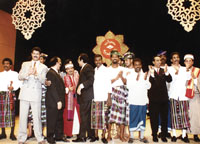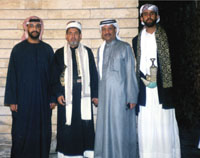
Qasim Zobaida: ” My door is never closed for those who are talented” [Archives:2006/994/Culture]
October 30 2006
 |
 |
It's the first time I meet Qasim Zobaida face to face. A lot of second hand impressions went through my mind before the meeting that shaped him as a strict rigid man. But in reality I have found I couldn't be more mistaken. He startled me with his humorous behavior and witty jokes; he made me feel at ease instantly.
Yes he is all that and more. He is a man who is deeply grateful to our country and has devoted his life to represent the Yemeni legacy by all possible means particularly traditional chants and folklore songs with special emphasis on the fact that Yemen has a unique and rich cultural heritage. Zobaida is 56 and his family is the largest singing family in Yemen, both male and female. He now has over 30 children and grandchildren. For his education he has received it before the revolution so he studied Arabic language and the Quran only in groups until intermediate level. Then he took training in management.
Qasim Zobaida is the founder of the Association of Yemeni Religious Singers; can you tell us about establishing the Association of Yemeni Singers?
Each person has a special gift he or she is born with and my gift is my sweet voice. In my childhood, I used to sing in the parties made for those who completed memorizing the Quran. In 1968, at the age of 18, I began to think of becoming a singer in social occasions, but I was in need of someone who expands my horizons and builds up on the gift I was born with. I was looking for someone to lend me a hand, but my search was in vain.
Not only that, but once I went seeking help to one of the singers he insulted me and kicked me out of his home. I was bitter but not undaunted by this rejection, and determined to succeed as a singer of my own. I promised Allah if I master this occupation, My door is never closed for those who are talented and in need of a trainer. Now and because of Allah's favor my dream comes true and I think my association is the most successful one in Yemen.
And this is why I established this association. To represent the Yemeni legacy by all possible means particularly traditional chants and folklore songs.
What are your activities inside Yemen and outside?
First of all, I have taught most of the singers in Yemen. When teaching, I give the Quran a lot of reference of Arabic language and it makes singers give each word its correct pronunciation. Then I teach them prosody, grammar, morphology and rhetoric. After that, they begin to learn the sphere of the tune. I didn't convey the tunes as they are, but I renew them that don't break the tradition radically but show them clearly.
Outside Yemen, we made contributions in various ceremonies in opera in Egypt, Emirate, Shariqha, Abuthabi, France and America. In these parties I show how the love and loyalty to my cultural heritage have guided all my thoughts and actions.
Further, Shaikh Sultan bin Zaid Al-Nihyyan invited us to sing in his wedding party. He gave one million Yemeni Riyals and 600 grams of gold to each chanter. An honorary degree was conferred on us by Esmat Abdul Majead, the previious Secretary General of Arab University, and by Amr Mosa, as well as by several Egyptian cultural officials.
How do you describe your audience?
We are in a good demand in Yemen since I am in each and every home. I am present when Yemeni's are happy and when they grieve. We participate also in national festivals. But outside our audience is much larger – especially in Egypt. I think that is so because here, I represent Yemeni heritage to Yemenis who already know about it, whereas abroad people are more interested. The other reason is the attitude of some Yemenis to their history and heritage. They feel ashamed of it and try to deny it.
From where do you derive your songs?
I am a poet so mostly I derive my songs from my own poems, and those of Al-Bowsari, Ahmed Shawqi and Al-Walid. Also, I make it a point to take one poem from every Yemeni poet, whether he is classical or popular.
Do you have a fixed number of singers working in your association and what are the conditions for admission to the Association of Yemeni Religious Singers?
The association welcomes anyone who is gifted and wishes to improve his talent.
What about women, are there female singers?
Sure, but not in my association. There are a lot of women who sing in wedding parties, on the Prophet's birthday and other occasions. I have taught my daughters and they have taught other women in turn.
Is chanting your main job?
No, it's mainly established for the sake of Allah. For me, my main job is a counselor of religious affairs for the capital city.
You said earlier that you're aim is to present Yemen's cultural heritage to the world, however, since you are no longer the head of the association, has this changed?
Today the association has become more politically oriented and not just a cultural association. While the idea of partisanship dominates some of its members, much of its association's activities begin to go through in a bubble. They begin to work for representing their parties rather than Yemen.
What are the tools you normally use?
Our songs are not accompanied by music and the only tools we use are the loudspeakers and sometimes Al-Bar'a ( a tambourine).
Who would you like to reach with your songs or your association?
A letter of pain that through your newspaper may reach the ears of the Cultural and Information Ministers.
In my letter I say, \”Is this the way you deal with whom he affords Yemen his compassion and strength until his beard goes white. Then you shoot me down as the westerners do with the old horses. Thank you indeed.””
——
[archive-e:994-v:14-y:2006-d:2006-10-30-p:culture]”


